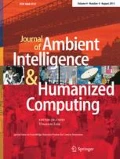Abstract
Probabilistic logic and uncertain logic, as two branches of the multi-valued logic, have been proposed for dealing with knowledge with random factors and with human uncertainty, respectively. As a generalization, this paper proposes an uncertain random logic to deal with complex knowledge containing random factors and human uncertainty simultaneously, and derives a formula to calculate the truth value of an uncertain random proposition. As an inverse problem of the uncertain random logic, this paper also proposes an uncertain random entailment model which calculates the truth value of a function of some uncertain random propositions based on the truth values of some other functions of these uncertain random propositions. As a byproduct, a probabilistic entailment model is also discussed.
Similar content being viewed by others
References
Chen X, Ralescu DA (2011) A note on truth value in uncertain logic. Expert Syst Appl 38(12):15582–15586
Dubois D, Prade H (1987) Necessity measures and the resolution principle. IEEE Trans Syst Man Cybern 17(3):474–478
Dubois, D, Prade H (1988) An introduction to possibilistic and fuzzy logics. In: Smets P, Mamdani A, Dubois D, Prade H (eds) Non-standard logics for automated reasoning, Academic Press, San Diego, 287–326
Dubois D, Prade H (1990) Resolution principles in possibilistic logic. Int J Approx Reason 4(1):1–21
Gao J, Yao K (2015) Some concepts and theorems of uncertain random process. Int J Intell Syst 30(1):52–65
Lee RC (1972) Fuzzy logic and the resolution principle. J Assoc Comput Mach 19(1):109–119
Li X, Liu B (2009a) Foundation of credibilistic logic. Fuzzy Optim Decis Mak 8(1):91–102
Li X, Liu B (2009b) Hybrid logic and uncertain logic. J Uncertain Syst 3(2):83–94
Liu B, Liu YK (2002) Expected value of fuzzy variable and fuzzy expected value models. IEEE Trans Fuzzy Syst 10(4):445–450
Liu B (2007) Uncertainty theory, 2nd edn. Springer, Berlin
Liu B (2009a) Some research problems in uncertainty theory. J Uncertain Syst 3(1):3–10
Liu B (2009b) Uncertain entailment and modus ponens in the framework of uncertain logic. J Uncertain Syst 3(4):243–251
Liu B (2010) Uncertainty theory: a branch of mathematics for modeling human uncertainty. Springer, Berlin
Liu B (2014) Uncertain random graph and uncertain random network. J Uncertain Syst 8(1):3–12
Liu YH, Ha M (2010) Expected value of function of uncertain variables. J Uncertain Syst 4(3):181–186
Liu Y (2013a) Uncertain random variables: a mixture of uncertainty and randomness. Soft Comput 17(4):625–634
Liu Y (2013b) Uncertain random programming with applications. Fuzzy Optim Decis Mak 12(2):153–169
Liu Y, Ralescu DA (2014) Risk index in uncertain random risk analysis. Int J Uncertain Fuzziness Knowl Based Syst 22(4):491–504
Marinos PN (1969) Fuzzy logic and its application to switching systems. IEEE Trans Comput 18(4):343–348
Nilsson NJ (1986) Probabilistic logic. Artif intell 28(1):71–87
Peng Z, Iwamura K (2010) A sufficient and necessary condition of uncertainty distribution. J Interdiscip Math 13(3):277–285
Prade Z (1982) Modèles Mathématiques de l’Imprécis et de l’Incertain en vue d’Applications au Raisonnement Naturel. Université Paul Sabatier, These de Doctorat d’Etat
Wen M, Kang R (2016) Reliability analysis in uncertain random system. Fuzzy Optim Decis Mak 15(4):491–506
Zadeh LA (1965) Fuzzy sets. Inf Control 8(3):338–353
Zedeh LA (1973) Outline of a new approach to the analysis of complex systems and decision processes. IEEE Trans Syst Man Cybern 3(1):28–44
Zadeh LA (1978) Fuzzy sets as a basis for a theory of possibility. Fuzzy Sets Syst 1(1):3–28
Zadeh LA (1979) A theory of approximate reasoning. In: Hayes J, Michie D, Mikulich LI (eds) Machine intelligence, Halstead Press, New York, 149–194
Zhang X, Li X (2014) A semantic study of the first-order predicate logic with uncertainty involved. Fuzzy Optim Decis Mak 13(4):357–367
Acknowledgements
This study was funded by the National Natural Science Foundation of China (Grant Nos. 61573210 and 61403360) and the Open Project of Key Laboratory of Big Data Mining and Knowledge Management, Chinese Academy of Sciences.
Author information
Authors and Affiliations
Corresponding author
Rights and permissions
About this article
Cite this article
Liu, Y., Yao, K. Uncertain random logic and uncertain random entailment. J Ambient Intell Human Comput 8, 695–706 (2017). https://doi.org/10.1007/s12652-017-0465-9
Received:
Accepted:
Published:
Issue Date:
DOI: https://doi.org/10.1007/s12652-017-0465-9



